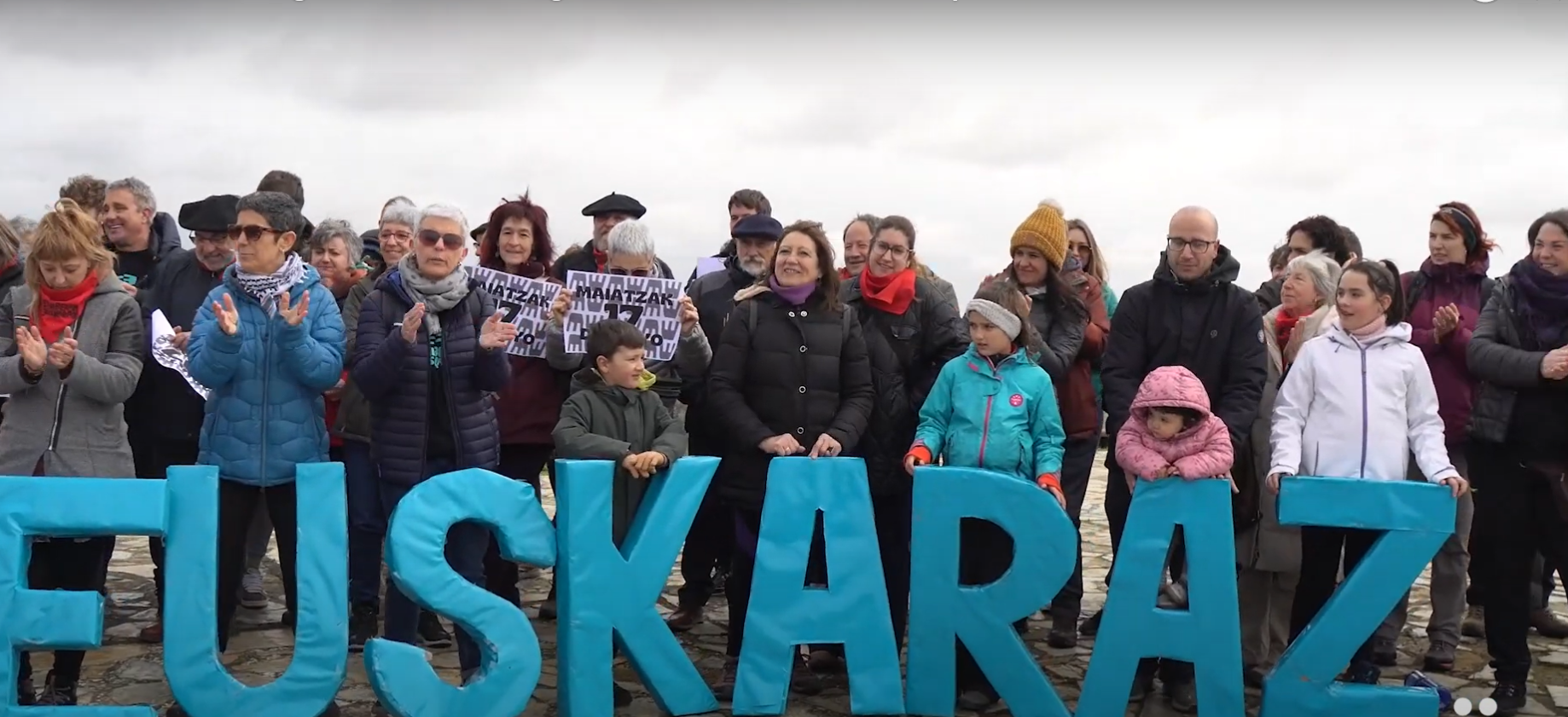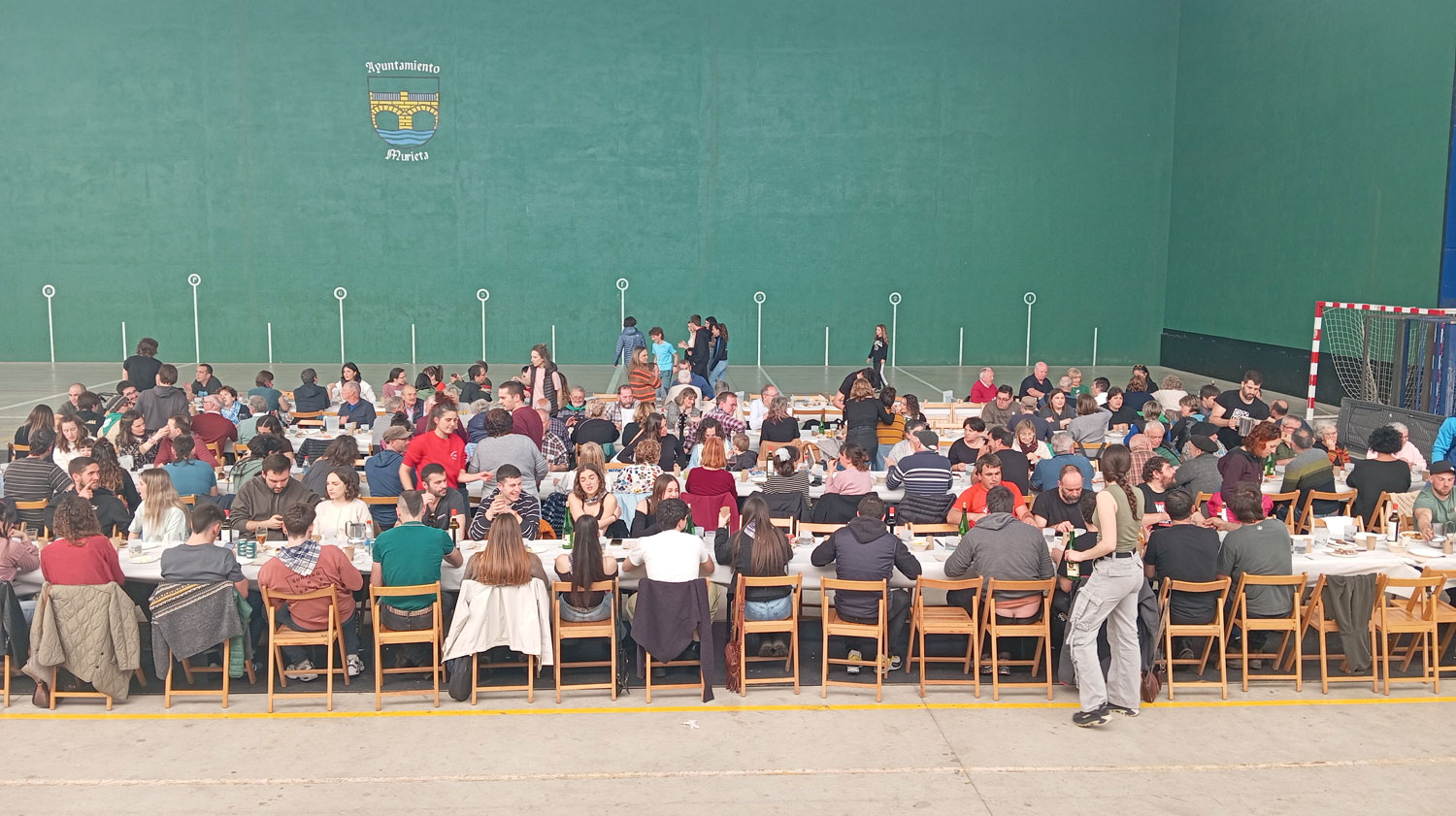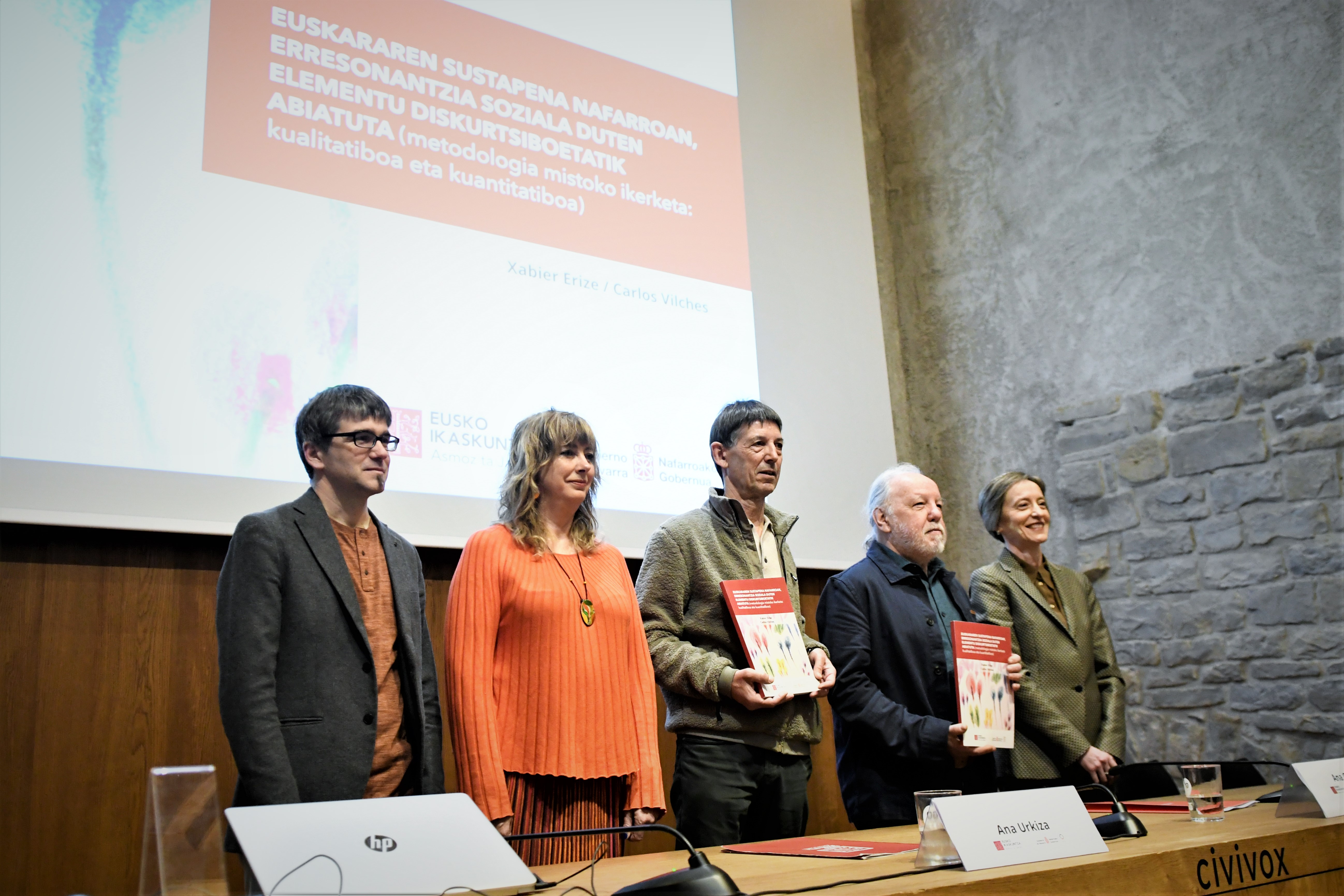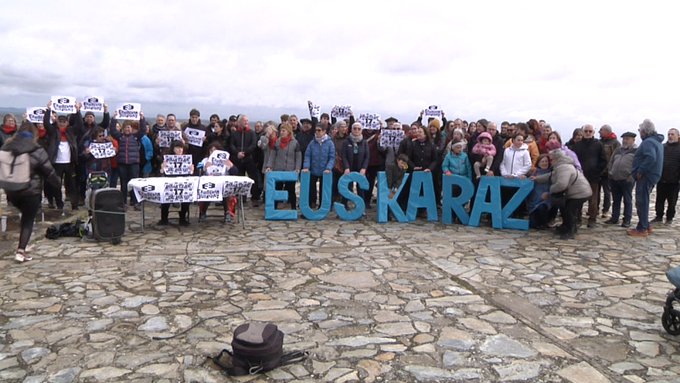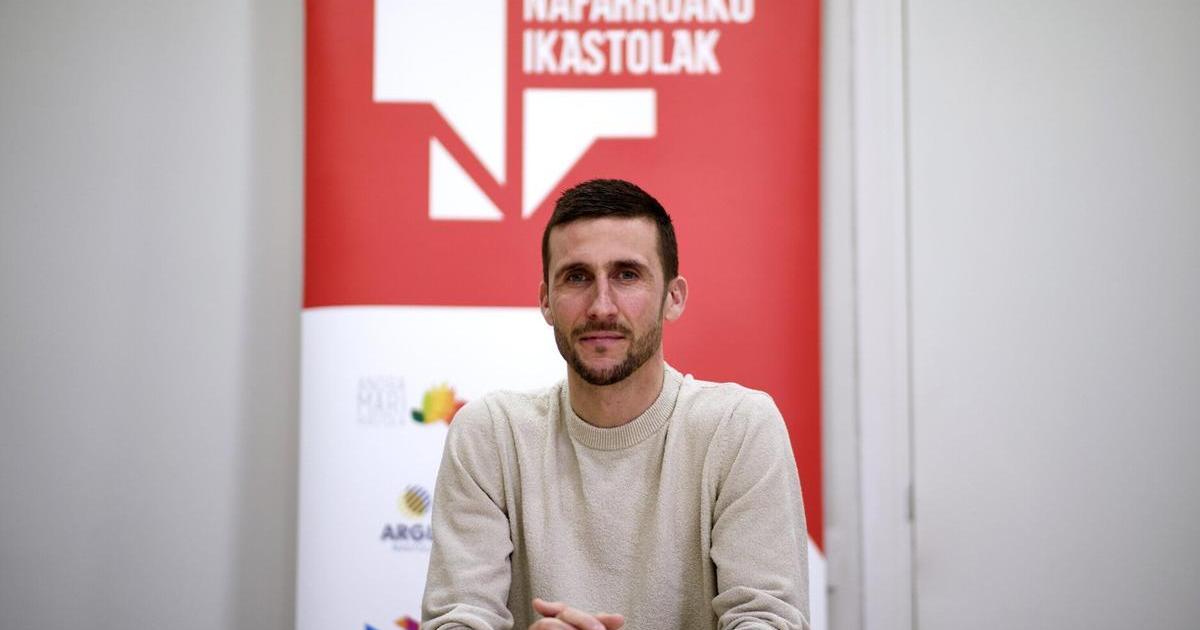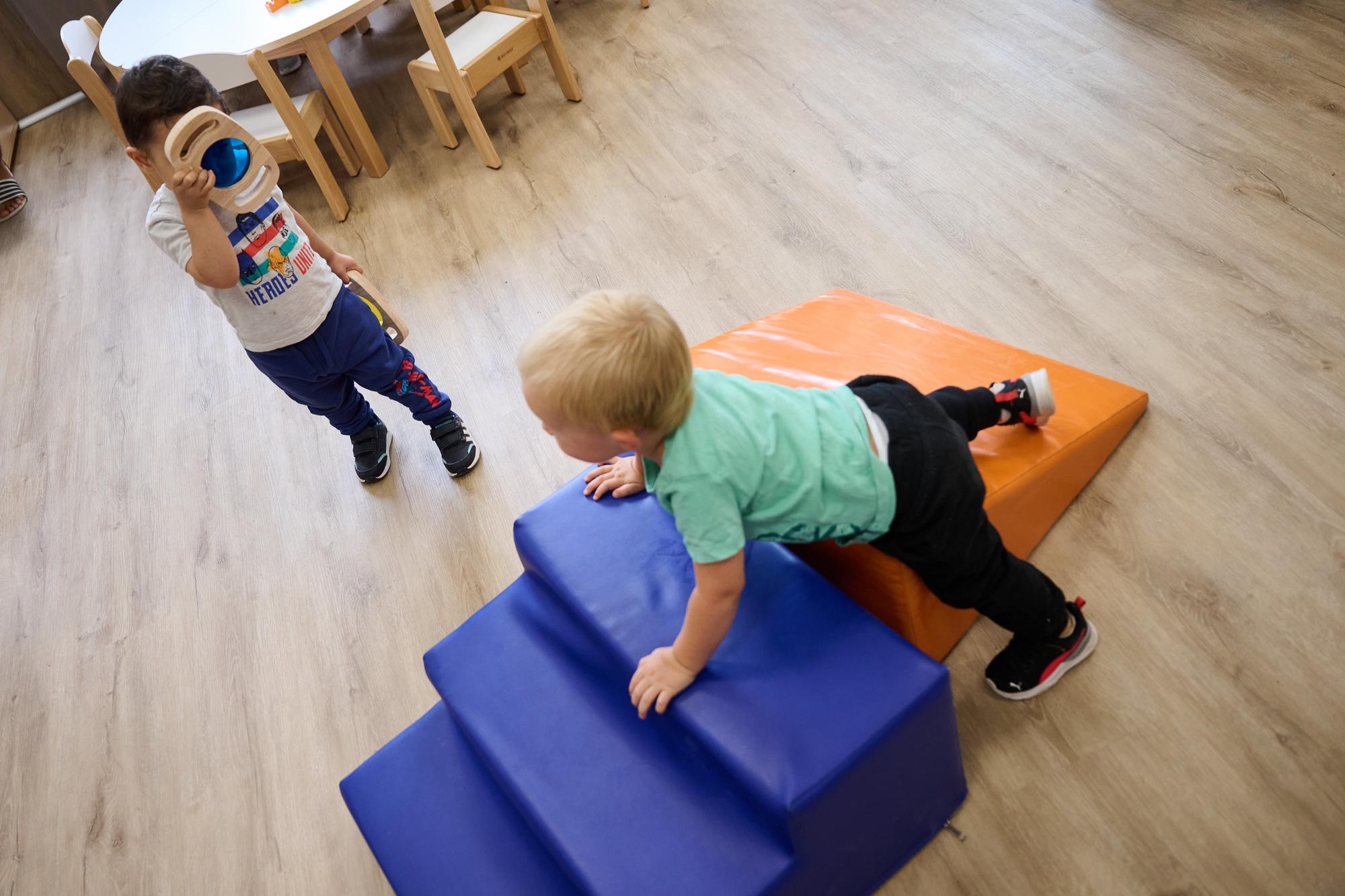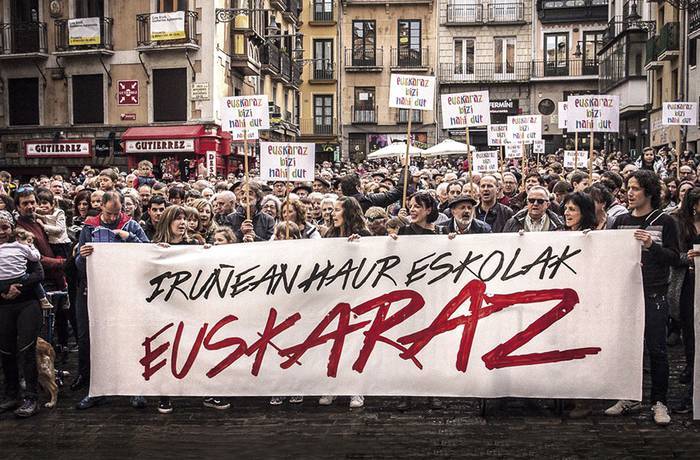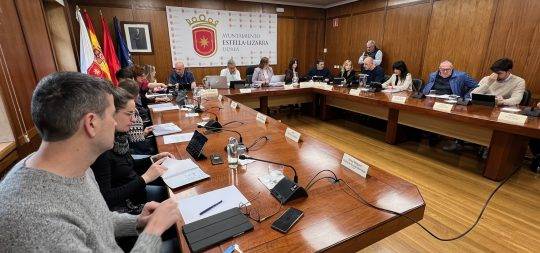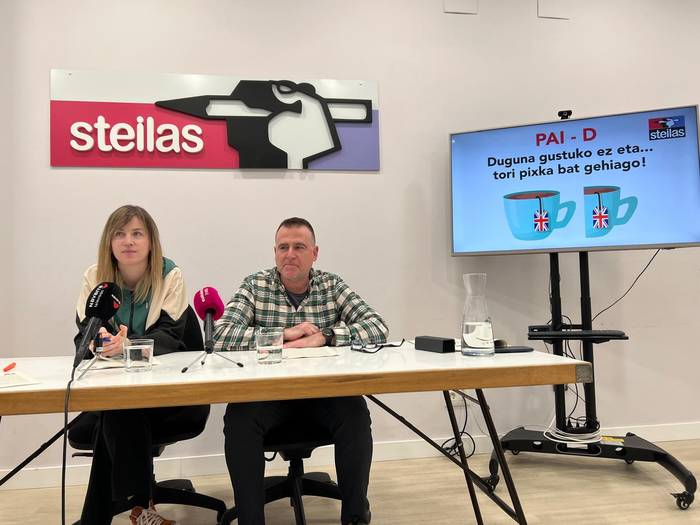"We need new allies for Euskera to advance"
- Euskaltzaleon Topagunea proposes new lines of discourse for an increasing attitude towards the Basque people in Nafarroa Garaia

Topagunea has presented the fruit of three years of work in the days held at the Condestable Palace of Pamplona. A concern triggered the process, the increase in opposition to the promotion of Euskera in the last two socio-linguistic surveys. It is based on a reality: the Vascophiles, the nationalists and model D itself are currently at 30%, and it is essential to obtain 50% of society’s defence in order to adopt measures that revitalize Euskera in Parliament. Throughout these three years, attitudes and discursive lines have been developed to achieve these new allies. Oskar Zapata, director of Navarra of the Topagune, has made these facts known in the Foral Metropolis of Euskalerria Irratia program.
After the presentation of your proposal, any emotional hangover?
A little bit yes. We have removed weight from it, because the public presentation of three years of work has its weight.
The media echo obtained by the hangover relief proposal: Gara and Diario de Noticias have disseminated it with that, Berria brings it to the skin.
It is very satisfactory. The socialisation of the work we have done is fundamental and it is very gratifying to see that things like this have aroused interest.
The starting point of your reflection has been a concern: since 2015, opposition to the promotion of the Basque country has increased in Nafarroa Garaia.
There has always been a large sector in Navarre that opposes the promotion of the Basque country. According to the latest surveys it is 37%. It's very big. And there's another 33 percent that's not for or against. We are therefore 30% in favour of promoting Euskera. This concern led us to reflect that what is important was not what we think or see, but what those who are not say, where they see what we can improve, where meeting points can be. That was the starting point of the process: let's hear how they see us.
So what were the objectives of this process?
One of the strategic objectives of the Topagune is to bring the majority of Navarros to positions favorable to the Basque Country, since for the Basque country to advance in Navarre we need courageous and effective measures that will be adopted in Parliament if more than 50% vote in favour. With this simple contribution we want to see if we are able to bring more people to the attitudes in favor of the Basque country, or at least to alleviate attitudes against it.
Who has participated in this collective reflection?
At first we created a stable group. Fourteen people have been with us, more or less intensely, during these three years. We have received many proposals. Great material. But we saw that we needed other contrast forums. Firstly, with people who know Basque. Always guaranteeing geographical and ideological heterogeneity. Then we did the same thing with people who are unrelated to the Basque country. And we also went through Topagunea's screen to come up with a document.
You received many varied opinions. A common formulation would not be easy.
No, but it has been very enriching. Above all, we have learned that it is very important to listen and value the voices of others. They want to help. All those who have contributed wanted us to help, whether we agree with us or not. We were clear that we did not want to make a 200-page report. We set ourselves a goal: not to write more than 15 pages. In the coming years we will write more. But now we wanted to propose line heads so that everyone can develop them as they like.
You have worked on the speech, but you have also proposed good practice. Why?
We had intended to offer only discursive lines, but in the process of their elaboration we learned that although the discursive lines are important, it is very important how we act before the society and people of Navarra. How we work affections. That is why we created a list of best practices.
In relation to practices, they have insisted on diversity. Why?
We must act with a broad social perspective if we are to influence Navarre. It is always said that Navarre is diverse and therefore political, geographical and linguistic. We will hardly achieve the defence of those who do not think like us if we do not approach them. It's important to have a class look. It is also important to work to provide adequate care to newcomers. And like these other practices.
From there they propose to revise the Navarra identity. How?
People have complex identities. This is becoming increasingly apparent. From the LGTBI movement and feminism have made very interesting contributions in this field. If we are talking about plurality, we must consider plurality as a whole. Not just ours. We all form this society and we all have to think about it together. Always understanding that Euskera is proof of the good health of this society. We want a richer, more plural and more democratic society. We bet on it by sharing our ideas with others and helping to come to those positions.
We must seek new allies, but we must also take care of them. They say we have to be pioneers on the path of diversity and equality.
Delivery and reception. Counting and listening. Those are the roads. It is not a question of me telling you what I am and asking you to defend it immediately. Let's see where we can do one. We have seen that by defending diversity and equality there is a useful opportunity to make new allies with groups and people who share these values. There we have an area where winning is a great opportunity.
Yesterday they were asked what diversity is.
Diversity in us is recognition of reality. Linguistic diversity is a reality in Navarra. Here we speak 100 languages. They play a number of functions in their territories and therefore bring them to Navarra. The Basque country has a single place to perform these functions. If in this diversity the Basque country is not located properly, we are talking about a false diversity. It is important to approach those who speak other languages and share spaces, but considering the Basque.
Yesterday, researcher Marina Massager pointed out that the greatest contribution that Navarre can make to the diversity of the world is precisely the maintenance of the Basque country.
Along with the Irati forest [kar, kar]. Let's talk about biodiversity, but also about sociocultural diversity.
As for the lines of discourse, they want to take the Basque language out of the game between parties and the clash of identities. Where?
It is important to move away from the usual dichotomies of those speeches that have been heard for many years around the Basque country and to move the debate to other new parameters. Yasmine Khris said yesterday at the conference that he does not feel either Navarro or Basque, but that he is Basque [Khris was born in Marseille, lives in Pamplona for five years and has studied Basque]. It is possible and beneficial to move from these dichotomies to others: diversity versus uniformization, coexistence and democracy versus authoritarianism. In these parameters we want to place the debate on Euskera.
This proposal to decouple Euskera from nationalism can be controversial.
We do not believe that the Basque country should move away from nationalism. We need all the supports, from where they come from. Another thing is where debates and speeches stand. Nationalism has contributed decisively to the current situation of Basque in Navarre. But we need that and more, because the people who are in favour of promoting Euskera are 30 percent, and the Abertzale vote is also 30 percent. If we want to be a majority, we need more people, who are outside those political positions, and we also need to offer discursive lines and possibilities so that if you want to give a slug you have discursive mangoes. If the political project to make Euskal Herria a state does not serve them, do we have possibilities to make different speeches to join them? Well, yeah. We have values that unite us around diversity, around equality, and we have a common path.
In addition to the new dichotomies, they propose new categories. Which ones?
We have classified the discursive lines that we propose in two categories. The first is linguistic ecology, related to the values that this implies: diversity, equality, care, sustainability. Coexistence is the second. The term coexistence has been widely used and we too must use it, because coexistence will come from recognition and not from denial of language and culture. Let us make values related to our coexistence: respect, recognition, democratic conflict management.
They say that equality is one of the keys. Why?
What we propose is to act fairly. We need special support for the vulnerable situation, prestigious measures and institutional support.
At the Amaia Nausia Pimoulir of Eusko Ikaskuntza-Sociedad de Estudios Vascos said that equality between citizens is broken, not teaching Euskera to all children.
I remember that in an interview I had with José Iribas [Minister of Education, at the time of UPN] he told me that in Navarra the Basque was imposed. And I told him that to impose a language, two conditions were necessary: being monolingual and being in power. It is clear that if we all understood the Basque Country we would be closer to equality, both in rights and in opportunities. We propose an inclusive model that allows us to do well in Spanish and Basque. As long as this is not there, we must support all models [A and B] that bring children closer to Basque. Would it be bad in Azagra, for example, to have contact with Euskera through education, unlike what happens today?
According to the study of Eusko Ikaskuntza-Sociedad de Estudios Vascos, cited yesterday frequently, the Basque is in Navarra amid the conflict between two national identities. How to socialize this new discourse in the midst of this conflict?
One of the keys is the democratic management of the conflict, because there is and there will be conflict. They are different positions. We must identify and commit to the elements necessary to live and live better together. Coexistence will come from the recognition of languages and cultures, and not from denial, and from that principle we must seek what contact points can be. That the Basque is alive from the understanding of consensus.
Maiatzaren 17an Erriberako lehenengo Euskararen Eguna eginen da Arguedasen, sortu berri den eta eskualdeko hamaika elkarte eta eragile biltzen dituen Erriberan Euskaraz sareak antolatuta
We have had to endure another attack on our language by the Department of Education of the Government of Navarre; we have been forced to make an anti-Basque change in the PAI program. In recent years, by law, new Model D schools have had to introduce the PAI program and have had... [+]
Prentsaurrekoan, maiatzaren 17an ospatuko duten Erriberako Euskararen Egunaren inguruko argibideak eman dituzte. Ume, gazte zein helduentzat zuzendua izango da. Ekimena, Erriberan egiten diren ekimenetan indarrak biltzeko eta euskararen normalizazioaren alde saretzeko... [+]
Nafarroako Ikastolen Elkarteak lehendakari berria du. Oier Sanjurjok hartu dio lekukoa Elena Zabaleta Andresenari. Beste zazpi kide izanen ditu alboan Sanjurjok.
Ez dira gutxi azken boladan euskara bere onenean ez dagoela eta bere transmisioa bermatuta ez dagoela ohartarazten ari diren ahotsak. Bestetik, inork ez du ukatzen hezkuntzak ezinbesteko betebeharra duenik euskara eta euskal kulturaren biziraupenerako. Erronka estrategikoa... [+]
Iruñeko haur eskoletako zuzendariek, EH Bildu, Geroa Bai, Zurekin Nafarroa eta PSNren arteko akordioa kritikatu dute. “Murgiltze ereduaren alde egin dugu beti, baina inoiz ez da gure iritzia kontutan hartzen” salatu du Euskalerria Irratian, Garikoitz Torregrosa... [+]
Euskarazko eskaintza handitzeko akordioa erdietsi dute EH Bilduk, PSNk, Geroa Baik eta Zurekin Nafarroak
Plazara, AEK, Uda Leku, Dindaia eta Ebete antolakundeak Baionan elkartu dira Famili'on egonaldi ibiltariaren lehen edizioa aurkezteko. Hizkuntza mailaren arabera eskaintza bat edo beste egongo da eta haur zein gurasoentzat izango da udaberrian.
Administrazio Epaitegiak arrazoia eman dio EH Bilduk Lizarrako plantilla organikoaren hizkutnz profilen aurka jarritako helegiteari.









